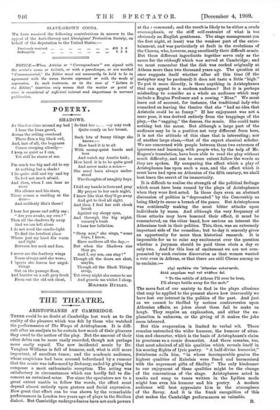THE THEATRE.
ARISTOPHANES AT CAMBRIDGE.
THERE could be no doubt at Cambridge last week as to the reality of the pleasure which was felt by those who watched the performances of The Wasps of Aristophanes. It is diffi- cult after an analysis to be certain how much of their pleasure they owed to the author of the play. But the amount of their other debts can be more easily recorded, though not perhaps more easily repaid. The new incidental music by Dr. Vaughan Williams is full of humour, and, what is still more important, of excellent tunes; and the academia audience, whose suspicions had been aroused beforehand by a rumour that the music was influenced by Debussy, ended by giving the composer a most enthusiastic reception. The acting was satisfactory in circumstances which can hardly fail to dis- concert an untrained actor. For since the spectators are to a great extent unable to follow the words, the effect must depend almost entirely upon gesture and facial expression. How great that effect can be was shown by the remarkable performances in London two years ago of plays in the Sicilian dialect.- But Cambridge undergraduates have not such powers at the r command; and the result is likely to be either a crude overemphasis, or the stiff self-restraint of what is too obviously an English gentleman. The stage management (on the first night, at least) was the weakest part of the enter- tainment, and was particularly at fault in the evolutions of the Chorus, who, however, sang excellently their difficult music. But these different ingredients together serve only as the sauce for the rechauffe which was served at Cambridge ; and we must remember that the dish was cooked originally at Athens more than two thousand years ago. The question at once suggests itself whether after all this time (if the metaphor may be pardoned) it does not taste a little "high." To put it more directly, is there anything in Aristophanes, that can appeal to a modern audience P But it is perhaps misleading to consider as a whole an audience which may include a Regius Professor and a rowing " Blue." We must leave out of account, for instance, the traditional lady who remarked on leaving the theatre that she " had no idea that Aristotle could be so funny." If her enjoyment was not a mere pose, it was derived entirely from the trappings of the play,—the "ragging," the dances, the music. She could taste nothing but the sauce. But although a large part of the audience may be in a position not very different from hers, it is not the attitude of this class that is interesting ; nor of another large class,—that of the expert classical scholar. We are concerned with people between these two extremes of ignorance and learning, with people who, by the help of Mr. Rogers's translation, have been able to read the play without much difficulty, and can to some extent follow the words as they are spoken. By comparing the effect which a play of Aristophanes has upon such a man, and the effect which it must have had upon an Athenian of the fifth century, we shall best learn the secret of its immortality.
It is difficult to realise the strength of the political feelings which must have been roused by the plays of Aristophanes when they were first acted. In these days even an abstract discussion of politics is "deprecated" by the Censorship as being likely to cause a breach of the peace. But Aristophanes was continually making the most bitter attacks upon individuals by name. And although the very frequency of these attacks may have lessened their effect, it must be remembered, on the other hand, how serious an interest the Athenians took in their politics. This, then, was an extremely important aide of the comedies; but to-day it scarcely gives an opportunity for more than historical research. It is impossible for us to raise any excitement over the question whether a juryman should be paid three ()bola a day or only two. And for this loss of excitement we are not com- pensated by such curious discoveries as that women wanted a vote even in Athens, or that there are still Cleons among us to exclaim :— 06x1 IrpoWaw rbv 'Aenrafwv xoAoo•vprde, (IAA& paxeigars wAilhous lief.
" To the rabble of Athens I'll ever be true, I'll always battle away for the mob."
The mere fact of our anxiety to find in the plays allusions that may be applied to the present shows how irrevocably we have lost our interest in the politics of the past. And just as we cannot be thrilled by serious controversies upon Athenian affairs, so jokes about them fail to make us laugh. They require an explanation, and either the ex- planation is unknown, or the giving of it makes the joke seem laboured.
But this evaporation is limited to verbal wit. There remains untouched the wider humour, the humour of situa- tion and character, which is the basis of Aristophanes's claim to greatness as a comic dramatist. And there remains, too, that most admired of all his qualities which reveals itself in, his soaring flights of lyric poetry. "A half-divine humorist," Swinburne calls him, "in whose incomparable genius the highest qualities of Rabelais were fused and harmonised with the supremest gifts of Shelley." The only hindrance to our enjoyment of these qualities might be the change of the conventions of the stage. Aristophanes acted in masks and sung to tunes written in the Lydian mode might lose even his humour and his poetry. A modern audience will best appreciate him in the atmosphere of the Savoy. And it is the frank recognition of this that makes the Cambridge performances so valuable.
B.






































































 Previous page
Previous page